15th Jun 2022
Is Your ‘Normal’ Thyroid Test Hiding the Source of Your Depression?
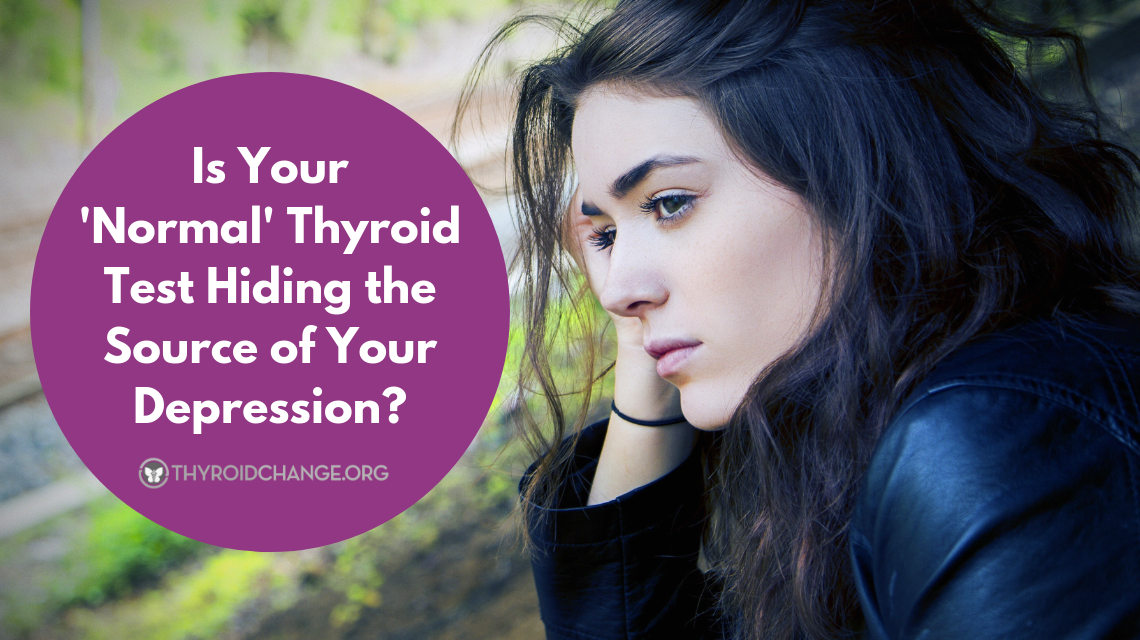
What You'll Learn:
- Why the symptoms of a thyroid disorder, including depression and flat mood, are often missed.
- The connection between thyroid disease and mental or psychiatric conditions.
- Why standard thyroid testing misses many cases of thyroid disease.
- The relationship between thyroid disease and adrenal dysfunction.
- Factors influencing cortisol output.
- Recommended thyroid blood tests that you need.
Depression is a known symptom of thyroid disease. The exclusive use of the TSH laboratory test does not identify all patients with thyroid hormone imbalance since it is a measure of pituitary function not of thyroid hormone. Therefore, expanded thyroid hormone testing must be conducted before a patient is diagnosed with a mental health disorder.
Do you have one or more of the following symptoms?
- Unexplained weight gain or loss
- Swelling, puffiness
- Low energy, depression
- Racing heart, anxiety
- Lethargy, sleeplessness
- Digestive disturbances, constipation or loose stools
- Brain fog, forgetfulness
- Aching muscles, cramps
- Hair loss, thinning
- Dry skin, brittle nails
If so, you could be among the nearly 200 million people worldwide (the majority of whom are women) who have some type of thyroid problem [1].
If you also suffer from symptoms of depression, did you know that a “normal”, in reference range thyroid test can be masking a critical link between these two conditions? It could possibly be the source of your depression
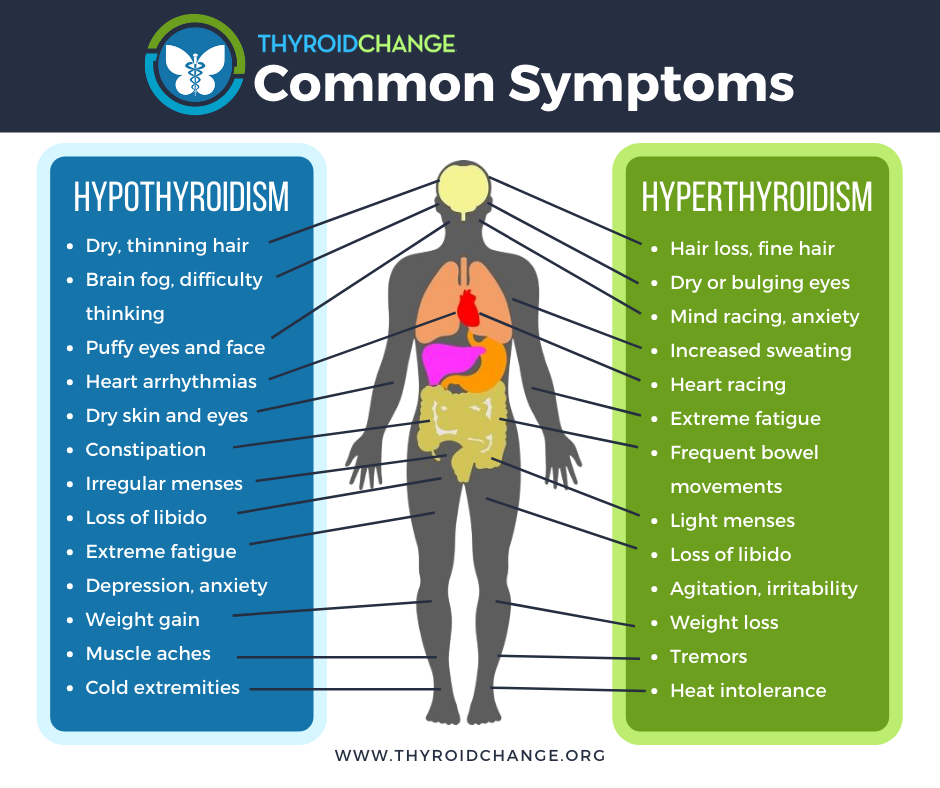
The Thyroid Gland: A Quiet Regulator
Most of us never think about our thyroids. Yet this butterfly-shaped, master gland regulates some of the most critical functions of the human body.
From the production of hormones to regulating metabolism, the thyroid helps maintain healthy weight, overall immunity, and even regulates mood and memory functions. When one or more of these systems is disturbed, we must explore a possible connection to thyroid to avoid treating the symptoms while neglecting a root cause.
Hyperthyroidism is a condition in which the thyroid gland produces too much thyroid hormone. Characterized by feelings of anxiety, a racing heart, bouts of insomnia, diarrhea, and weight loss, this is more rare than underactive thyroid, and has the potential to trigger heart and bone problems.
An underperforming thyroid, or hypothyroidism, is a condition in which the thyroid gland doesn’t produce enough thyroid hormone. Despite being incredibly common, hypothyroidism is one of the most under-diagnosed conditions in America.
At least 20 percent of all women have an under responsive thyroid – yet only half of those women get diagnosed.
And the other half? For reasons I will explain, too many of these patients are given a clean bill of physical health, and a prescription for an antidepressant.
Are You Really a Mental Patient?
As a holistic psychiatrist, I often refer to psychiatric pretenders: physiological conditions that masquerade as symptoms of mental illness. In my experience, a vast majority of psychiatric symptoms are actually driven by thyroid dysfunction.I’m not alone in these observations. Scientists like Dr. Mark S. Gold, a world-renowned addiction expert, have long known about the relationship between a dysfunctional thyroid and symptoms of depression [2]. Through ongoing research, this correlation continues to be validated [3].
So, why the staggering number of missed diagnoses?
Missing the Diagnostic Mark
Symptoms of thyroid dysfunction can vary broadly, and unfortunately, are not easily pinpointed in the standard diagnostic exam.
Complaints of low energy, flat mood, poor sleep, and appetite disturbance, are too easily hung on the nail of “depression”, for which an easy fix is applied – a prescription for antidepressant medication.The standard medical test for thyroid, called TSH, measures
thyroid stimulating hormone levels. Even when doctors perform this test, their interpretation of the clinical picture is limited by their biases.
I speak from experience when I say that most physicians are simply not trained to diagnose thyroid imbalance properly.
Where Standard Thyroid Testing Goes Wrong
Thanks to growing awareness among sufferers, what constitutes a normal thyroid test result has come under scrutiny. Here are four ways in which many practitioners and medical standards have failed patients:
1. Over-reliance of the TSH Test
The TSH test measures only one hormone in the blood (the thyroid stimulating hormone produced by the pituitary gland), rather than the entire range of thyroid-produced hormones – of which there are five identified. And doctors rarely look at free hormone levels
– levels of thyroid hormones in the blood that aren’t bound to proteins.
2. Forgetting to Test Thyroid Antibodies
They also miss screening for thyroid antibodies related to Hashimoto’s or Graves’ disease
, which would demonstrate an autoimmune component to the imbalance, distinguishing it from nutrient-deficiency thyroid dysfunction, for example.
3. Over-reliance of Levothyroxine
Doctors often apply a one-size-fits-all “fix” in the form of a synthetic hormone called, Synthroid (the brand name of levothyroxine, a T4-only medication).
The gold-standard T4-only thyroid treatment, Synthroid, is the most-prescribed drug on the market today [4]. Based on proper interpretation of optimal thyroid hormone labs of T3 and T4, combination T3/T4-containing medications (liothyronine + levothyroxine) might be needed for many patients.
However, with inadequate analysis of optimal Free T3 and Free T4 levels, patients are prescribed treatment that fails them.
4. Relying on Broad Reference Ranges
Results may fall within normal range even when thyroid autoantibodies are grossly elevated or when thyroid hormone levels are not optimal for the individual patient. Data suggests that this is relevant to those suffering from mood, anxiety, and cognitive complaints. Current medical standards allow for a normal result within the vast range of 0.5 to 5.0. However, variations in laboratory testing as well as deviations by age, pregnancy, and other health factors, have allowed many patients at the fringes (and well beyond) to go undiagnosed [5].
The Thyroid’s Relationship with Adrenals
Any effort to resurrect thyroid function cannot afford to ignore the adrenal glands. The adrenals are small glands that sit over our kidneys. Through the production of hormones and neurochemicals, adrenals help us respond to life’s everyday demands.When signaled by the brain, adrenals produce the stress hormone cortisol, which is intrinsically tied to thyroid functionality. This is key to why stress has a direct impact on thyroid and mood.
Whether through overactive cortisol production (a state of chronic fight or flight), or the brain essentially shutting down cortisol secretion, patients who suspect thyroid dysfunction must test cortisol output throughout the day to see the big picture. When properly tested, thyroid patients often show abnormal adrenal output.
The next question to ask is “Why?”
Adrenal Stress Factors
When we consider the potential stressors affecting adrenals, the following offenders stand out:
1. Birth control pills
Even with normal test readings, these synthetic hormones lower available thyroid hormone in the body by elevating thyroid-binding globulin. This protein binds to thyroid hormone in the bloodstream. When thyroid-binding globulin goes up, your thyroid levels go down.
2. Gluten
The thyroid contains proteins that resemble those found in gluten, confusing the immune system, which pounces on the thyroid like a foreign invader. Studies show people with celiac disease have three times the risk of thyroid dysfunction, as well as a strong association between untreated celiac disease and depression.
3. Fluoride
Once used to suppress overactive thyroid, fluoride interferes with multiple aspects of the thyroid’s tissues, disrupts normal hormone physiology, displaces iodine and depletes selenium, two critically essential elements for thyroid function. Recent research shows that fluoride in water increases risk of thyroid illness by 30 percent [6].
4. Endocrine Disrupters
Industrial and agricultural chemicals such as phthalates, flame retardants, and PCBs interfere with the thyroid’s biology. The resultant disruption can present as immune system hyperactivity, as well as disturbances in mood.______
The Thyroid is a Canary in the Coal Mine
Connecting the dots between these physiological functions and mental health may seem convoluted and difficult at first, but not after you come to appreciate the direct, intimate relationship shared between these networks in the body.The thyroid is a canary in the coal mine. In our fast-paced, nutrient-depleted world that’s filled with toxic substances, your thyroid gland may be the first to come under siege. While you may not feel the attack in your thyroid per se, you’ll feel it in your mood and cognition.
______
What Are The Best Thyroid Tests?
If you suspect thyroid may be at the root of your depression and physical symptoms, it’s important to be empowered by facts. The idea of your physiology working in tandem with your mental health isn’t something most doctors agree on, so be prepared to guide the process – or find a new doctor.
For starters, insist on testing (or order your own) beyond the standard TSH. The following breaks down my own testing protocol:
1. Full Thyroid Panel
Measure the full range of thyroid hormones in the blood, including thyroid antibodies.
Ask your doctor to run this panel, or you can order them here:
Test for TSH, T4, free T3 (FT3), reverse T3 (RT3) and the antibodies listed below.
2. Hashimoto’s and Graves’ Disease
It’s imperative to screen for thyroid autoimmune diseases.
For Hashimoto’s thyroiditis, order thyroid peroxidase antibodies (TPOAb) and thyroglobulin antibodies (TgAb).
If you suspect hyperthyroid symptoms, screen for Graves’ disease by ordering TPOab, TRAb, TSI, and TBII. Again, ask your doctor to run this panel, or you can order them here.
3. Cortisol Levels
For optimal thyroid functioning, the pattern of cortisol output must be optimized. You may choose to test your salivary cortisol, although this is why I don’t typically do this test with my own patients.
Quick Tip!
For help interpreting the results of these tests, I recommend connecting with an experienced functional medicine doctor or naturopath who has experience working with thyroid patients. SteadyMD also has great integrative doctor options who specialize in thyroid health.
Safeguard Your Thyroid to Improve Your Mood!
I share the protocol that I have used to support hundreds of patients through their mental/health challenges in my book, A Mind of Your Own.
This protocol includes the comprehensive testing I have outlined here, which goes far beyond the standard employed by traditional doctors.
But these tests are just the beginning. The next steps are a series of diet and lifestyle adaptations that will begin to bring these critical systems back into balance.Supporting a healthy thyroid is an exercise in holistic medicine. It starts with supporting the immune system so it doesn’t attack the body’s own tissues and manifest as symptoms of depression – and autoimmune disease.
The healing journey continues with the awareness of what’s really going on in your body, and deepens as you become empowered by choices that support your vitality –mind, body and soul.To learn more, check out A Mind of Your Own. For hands-on support with these lifestyle changes, explore the Vital Mind Reset.
Reference
1 http://www.thyroid.ca/thyroid_disease.php
2 https://www.researchgate.net/publication/16572953_Hypothyroidism–or_is_it_depression
3 https://www.hindawi.com/journals/jtr/2012/590648/abs/
4 http://www.webmd.com/drug-medication/news/20150508/most-prescribed-top-selling-drugs
5 https://thyroidresearchjournal.biomedcentral.com/articles/10.1186/1756-6614-8-S1-A17
6.https://medicalxpress.com/news/2015-02-fluoridation-england-linked-higher-underactive.html#nRlv
© Kelly Brogan MD. This work is reproduced and distributed with the permission of Kelly Brogan MD. For more articles, sign up for the newsletter at www.kellybroganmd.com
Updated 12/30/2020
About the Contributor

Kelly Brogan, MD is a holistic women’s health psychiatrist, author of the NY Times Bestselling book, A Mind of Your Own, the children’s book A Time For Rain, and co-editor of the textbook, Integrative Therapies for Depression. She completed her psychiatric training and fellowship at NYU Medical Center after graduating from Cornell University Medical College, and has a B.S. from M.I.T. in Systems Neuroscience.
SIMILAR ARTICLES
More like this...
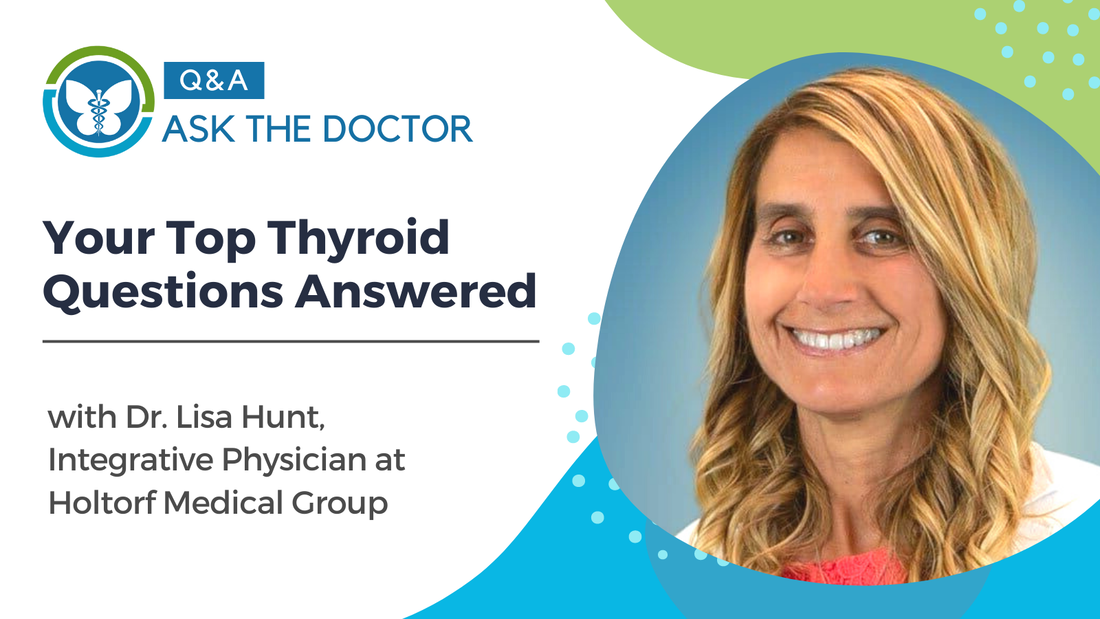
15th Jun 2022
Your Top Thyroid Questions Answered: Q&A with Dr. Lisa Hunt of Holtorf Medical Group
I had the pleasure of speaking with Lisa Hunt, D.O., an integrative physician at Holtorf Medical Group (www.holtorfmed.com) in El Segundo, CA a short while ago. I polled my audience and your top thyroid-related questions are answered here by Dr. Hunt. Dr. Hunt is a board-certified integrative physician and has extensive experience in thyroid health, hormone replacement, immune dysfunction and chronic conditions.
Read Article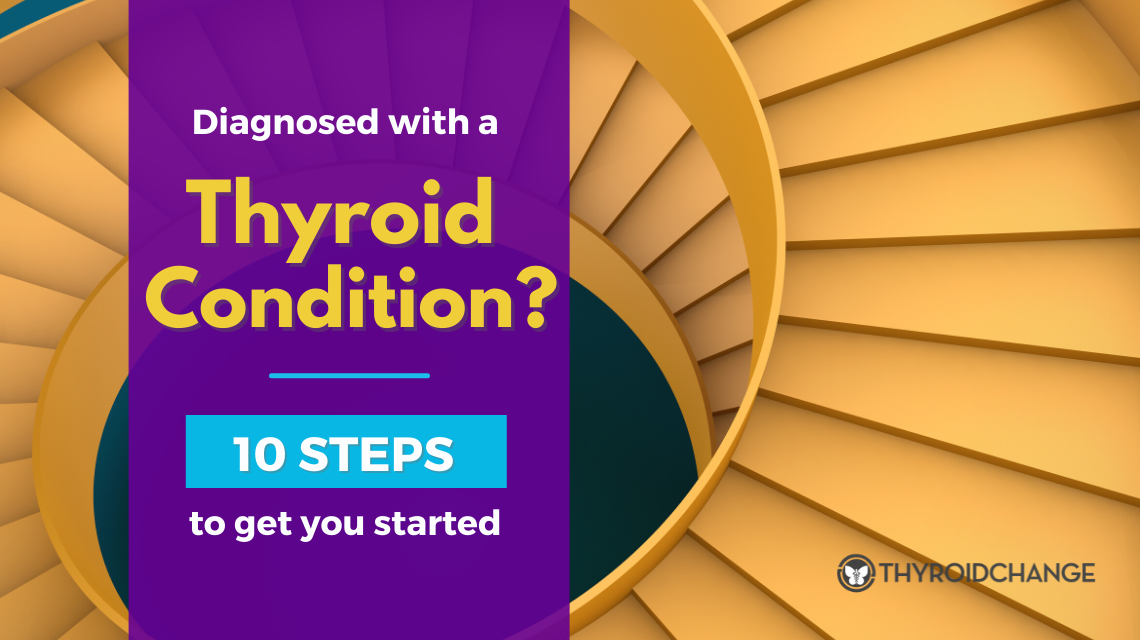
15th Jun 2022
Diagnosed With a Thyroid Condition? 10 Steps to Get You Started
Pursuing proper treatment and an overall healthy lifestyle that includes eating well and exercising can help you manage a thyroid condition. But what else can you do to live well with and thrive with your condition? The information can be overwhelming and Annabel Bateman, thyroid health advocate and author, has created this guide to walk you through essential lifestyle tips once you have been diagnosed.
Read Article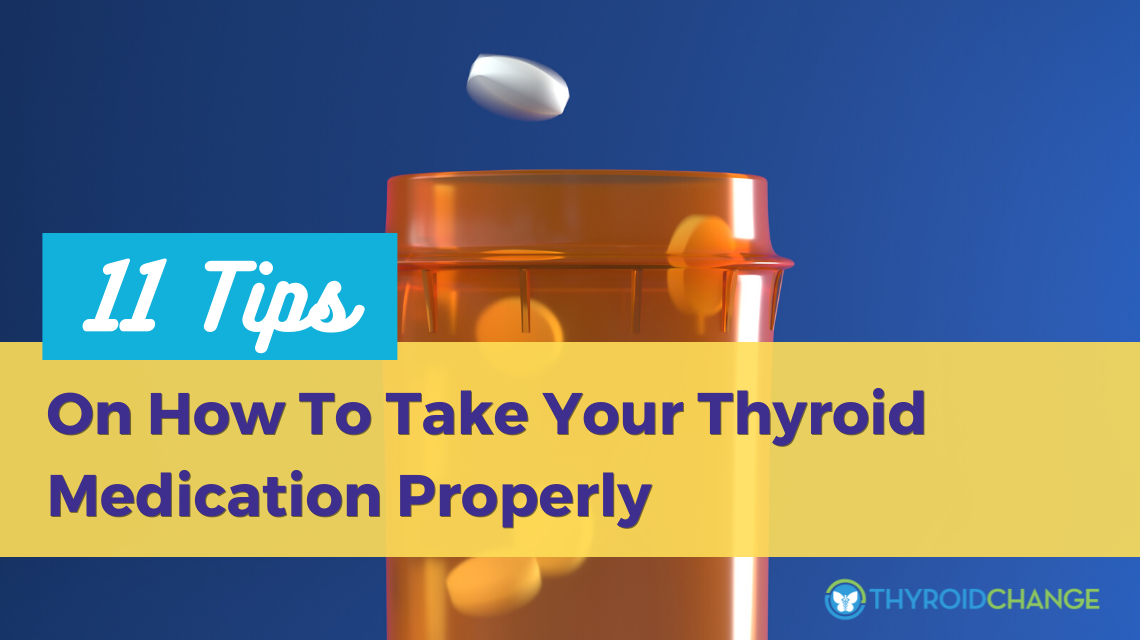
15th Jun 2022
11 Tips On How To Take Your Thyroid Medication Properly
Are you taking your thyroid hormone replacement medication correctly? Did you know that how and when you take your thyroid medication can affect your ability to absorb the necessary hormone properly? In the article below, I investigate the factors that contribute to correctly (or incorrectly) taking thyroid replacement hormone and on how thyroid patients can get the most out of their medication.
Read Article